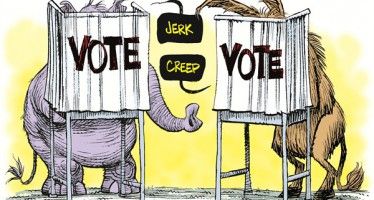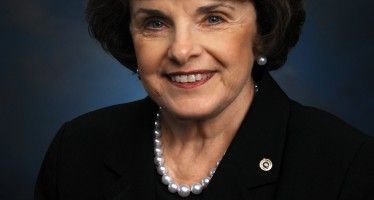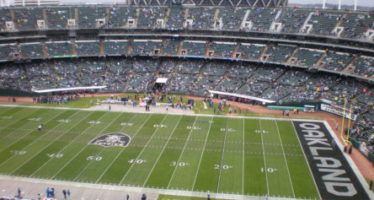Is Jerry Brown eyeing the White House again?

Gov. Jerry Brown’s crack public relations team has been hard at work convincing the rest of the country that he has sparked a California turnaround.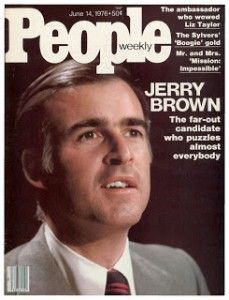 The New Republic even recommended to President Obama that, in his second term, he should “study the Moonbeam” for help cleaning up the growing list of government scandals and repair the economy.
The New Republic even recommended to President Obama that, in his second term, he should “study the Moonbeam” for help cleaning up the growing list of government scandals and repair the economy.
Brown’s resume is one which has required resiliency and creativity. He'll need that adaptability if the media start questioning why California ranks 48th in the nation on business climate; or ask about the complicated and unpopular personal income tax system consisting of 10 brackets and a top rate of 13.3 percent. The state tax rate ranks highest in the country in individual income tax, according to the Tax Foundation.
While Brown almost certainly is running for reelection to the governor’s office in 2014, I also think he is planning another run for president of the United States in 2016.
Brown is in Washington, D.C. this week, with plans to deliver a speech at the liberal Center for American Progress. He's touting his theme that “California is back.” He will be well received and in good stead with other speakers, including Secretary of State John Kerry and former Vice President Al Gore, both former Democratic nominees for president; as well as Sen. Kirsten Gillibrand, D-N.Y., and Chicago Mayor Rahm Emanuel.
Lucky number three or four?
“Lucky number three” worked for Brown when he ran for a third term as governor of California in 2010 — nearly 30 years after completing his second term. But lucky number three didn’t work out so well for Brown in his presidential bids of 1976, 1980 and 1992. His 1976 slogan was, “The Man of the Future, Who Respects the Past.”
Four could be Brown’s favorite number. Today, at 75, Brown could be enjoying retirement. But really, who thinks Brown will retire when there’s a reelection campaign to run, and maybe even a presidency awaiting him when he’s 78?
Brown's bio here on Spaceship Earth
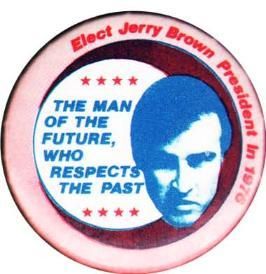 “We are all on Spaceship Earth,” Brown said in 1976, garnering him the nickname “Governor Moonbeam.” Even with the Moonbeam moniker, Jerry Brown is probably one of the most adaptable politicians in U.S. history.
“We are all on Spaceship Earth,” Brown said in 1976, garnering him the nickname “Governor Moonbeam.” Even with the Moonbeam moniker, Jerry Brown is probably one of the most adaptable politicians in U.S. history.
Brown is a former pre-Vatican II Jesuit seminarian. He also lost a bid for a U.S. Senate seat in 1982 to Pete Wilson, also later a governor.
When out of politics, Brown took a step back and traveled to Asia to study Zen Buddhism and worked with Mother Teresa in India.
In 1989, he took over as chairman of the state Democratic Party — then resigned in 1991, claiming disgust over the influence of political contributions on politics. After his failed presidential bid in 1992, he hosted a West Coast radio talk show in the mid-1990s.
In 1998, Brown ran for mayor of Oakland, and held the office for eight years. In 2006, Brown was elected as California Attorney General.
Gearing up
“Next month, Disney’s Alan Horn, DreamWorks Animation CEO Jeffrey Katzenberg, Steven Spielberg and other Hollywood powerhouses will host a Bel-Air fundraiser for the governor,” the Los Angeles Times reported this week. “The event, first reported by the Hollywood Reporter, will ask guests to pay at least $5,000 per person to attend.”
But even more importantly, the Times reported Brown had more than $10 million in a campaign account at the end of 2012, ostensibly saved for his 2014 reelection. But Republican squabbling could give him an easy re-election bid next year. If that happens, he could end up with a large campaign warchest that could give him an early advantage over potential Democratic presidential rivals.
Since the fundraiser, Brown has raised “an additional $3.5 million from his significant donor base that includes labor unions, tobacco companies and a myriad of others,” the Times said.
Ironically, the grubby campaign contributions Brown found so disgusting when he resigned as the head of the California Democratic Party two decades ago now have become appealing.
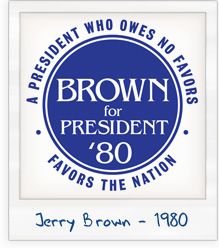 Brown's ideas
Brown's ideas
Over the years, some of Brown’s campaign's ideas found support even with conservatives. As a 1992 Democratic presidential candidate, Brown advanced the idea of a flat 13 percent tax rate for all Americans. It was designed by economist Arthur Laffer, who helped design President Reagan's 1981 tax cuts. Laffer heads the Laffer Center at the Pacific Research Center, CalWatchDog.com's parent think tank, to advance free-market reforms for California.
While the flat tax got him noticed in the 1992 presidential election, Brown has been been mum on a flat tax for Californians since he’s been governor this time around, and instead pushed and won a 29 percent increase in the top rate, to the 13.3 percent from Proposition 30.
But who knows? He could campaign again to bring the flat-tax to the national level.
A New York Times story published just before the 1992 primary season said Brown killed his presidential chances by telling a Jewish New York audience that, if nominated, he would consider the Rev. Jesse Jackson as a vice-presidential candidate.
“Mr. Clinton yesterday appeared to be straddling the divisions between the two groups [blacks and Jews], at once putting an advertisement on black radio stations touting his civil rights record and accusing Mr. Brown of pandering to blacks by saying he would choose the Rev. Jesse Jackson as his running mate,” the Times reported. “At a meeting with a Jewish group on Thursday, Mr. Brown was repeatedly asked how he could expect to win the Jewish vote after embracing Mr. Jackson, who referred to New York City as 'Hymietown' in the 1984 Presidential campaign.”
As he has been showing the past three years, the Brown of today has become much more savvy and pragmatic.
Back in California…
Governor Brown continues to forge ahead with his agenda rather relentlessly.
He has enthusiastically endorsed the $68 billion high-speed rail project, despite its many problems, as well as Obamacare implementation through the Covered California program. He supports the full implementation of AB32, the Global Warming Solutions Act of 2006, including the “clean air” regulations by the California Air Resource Board. These issues are unpopular with business owners and employers, agriculture, manufacturing, the construction industry, and those forced to bear the burden of the regulations.
Brown threw some red meat to his environmental base when he signed a bill making California the first state in the nation to ban hunting with lead bullets. And he signed a bill allowing nurses to perform abortions.
With praise from the national media, Brown seems to be solidifying the liberal “base” of the Democratic Party, not just for staying in his governor's office, but for a run at the Oval Office.
Related Articles
Proposals would make it easier for youth to vote
Democrats are pushing new legislation to make it easier for young people to vote. Given that young people in California
Under fire, Feinstein’s water bill collapses
It has been an uncharacteristically bad week for Sen. Dianne Feinstein, D-Calif. First, her quiet effort to engineer a substantial
NFL didn’t see Oakland bid to save Raiders as serious
As expected, NFL owners meeting at a Phoenix resort have given their blessing to Raiders owner Mark Davis’ plan to

